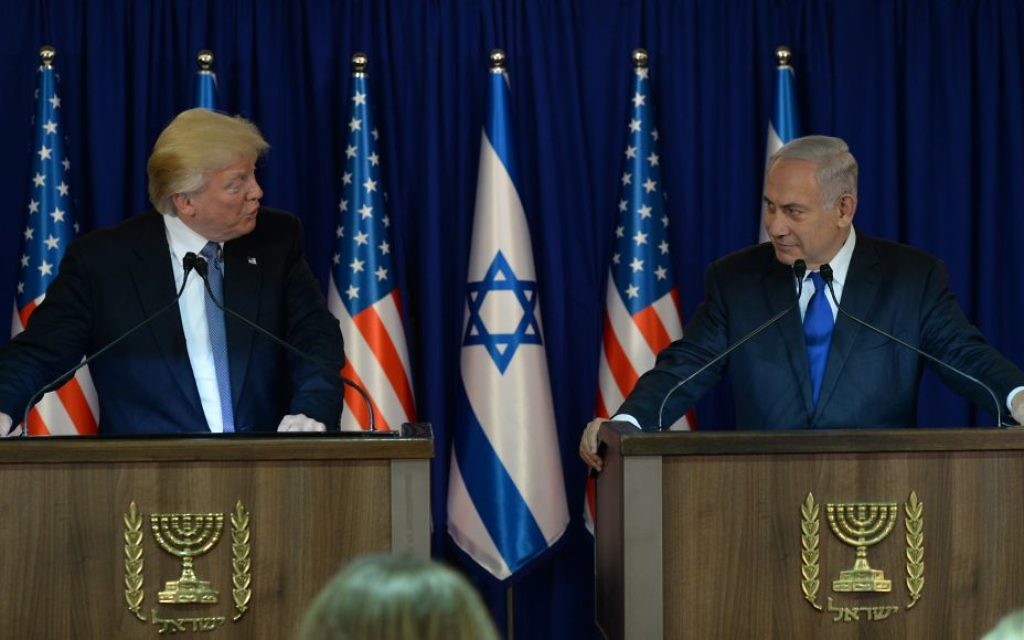The More Things Changed in 2017
2017 was the year the world stopped directing all its venom at Israel as a proxy for the United States and started directing all its venom at the United States as a proxy for Israel.

No one can deny 2017 was different from 2016.
Last December the U.N. Security Council voted to condemn all Israeli construction east of the 1949 cease-fire line as the main obstacle to peace. That 14-0 decision reinforced U.N. agencies’ insistence that the older, eastern side of Jerusalem, including the Temple Mount and Western Wall, had nothing to do with Jews or Israel.
The United States boldly abstained, either to give the two-state solution one more chance or to give Benjamin Netanyahu a final reminder of President Barack Obama’s feelings about him.
Get The AJT Newsletter by email and never miss our top stories Free Sign Up
This December, by contrast, we’ve seen a U.S. veto of a Security Council resolution viewing the United States as the great obstacle to a two-state solution because of President Donald Trump’s stubborn refusal to ignore the reality that Jerusalem is the capital of Israel.
Sure, the U.N. measure still portrayed Jerusalem’s Old City as part of an Arab tri-city area, along with Mecca and Medina, and still held the Palestinians blameless for the failures of the peace process. And the resolution again got 14 votes. But at least Israel took second billing as the Little Satan to the United States’ Great Satan.
So when your future grandchildren or great-grandchildren ask you what happened in 2017, you can tell them it was the year the world stopped directing all its venom at Israel as a proxy for the United States and started directing all its venom at the United States as a proxy for Israel.
Unfortunately, it’s also a year when more people used Israel as an excuse to attack Jews and when more people felt comfortable attacking Jews just for being Jews, no cover story needed.
Remember, the air in the metro area felt thick enough with anti-Semitism in March to inspire Davis Academy moms to launch the Atlanta Initiative Against Anti-Semitism.
That was before we saw local students make swastikas out of plastic cups, baked goods and dewy grass, among other expressions of hate and ignorance. It was before Holocaust denier David Irving came to town and inspired a devotee to scribble a swastika on a dinner menu.
It was before the debate over Confederate monuments gave Klansmen and neo-Nazis an excuse to go on the attack in Charlottesville, terrorizing a Jewish congregation, chanting “Jews will not replace us” and sparking violent clashes that culminated in a young woman being run over and killed.
One positive out of all this ugliness was the emergence of some much-needed female leadership in Jewish Atlanta, from Lauren Menis, Danielle Cohen, Lisa Freedman and Hildee Isaacs at AIAAS to new Anti-Defamation League Regional Director Allison Goodman-Padilla.
They joined such leaders as Federation Chief Impact Officer Jodi Lox Mansbach, Marcus JCC Chief Program & Innovation Officer Amanda Abrams and InterfaithFamily/Atlanta Director Rabbi Malka Packer-Monroe working within our community and Interfaith Community Initiatives Executive Director Judy Marx, Creating Connected Communities Executive Director Amy Zeide and The Packaged Good founder Sally Mundell reaching out to make Atlanta better for Jews and everyone else.
It’s a shame none of them participated in the panel discussion at what was otherwise one of the most hopeful events of the year, the end-of-August Federation awards ceremony that expanded to involve the Marcus JCC, Jewish Family & Career Services and Jewish Home Life Communities and drew attendees across denominational lines.
It was a year when Jewish Atlanta had to be ready for its national close-up. The Central Conference of American Rabbis, the Jewish Funders Network, The Collaboratory, the National Council of Jewish Women and the United Synagogue of Conservative Judaism held their national or international conventions here, and the most expensive congressional race in American history, featuring Jewish Democrat Jon Ossoff in a district with perhaps 40 percent of Jewish Atlanta’s population, drew national coverage half the year.
Jewish Atlanta might be left to its own devices more in 2018, when we hope to see the results of Federation’s Front Porch initiative, including a big January mission to Israel involving dozens of synagogues and other agencies.
On the other hand, the 6th Congressional District will go to the polls again.
At least we can count on the cycles of the calendar, from Purim and Passover in the spring to Rosh Hashanah, Yom Kippur and Sukkot in the fall to Chanukah and U.N. resolution season to end the secular year.




comments